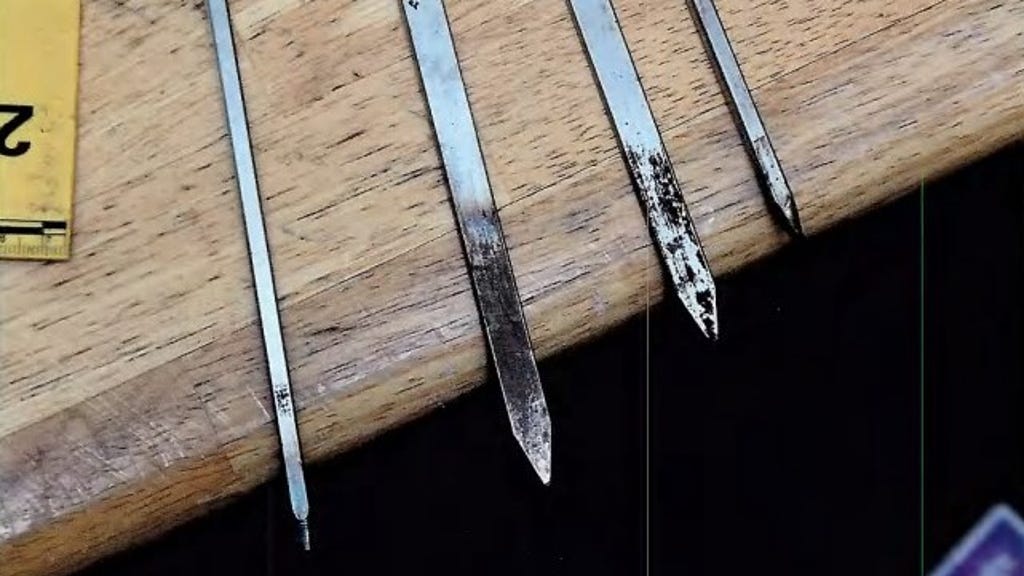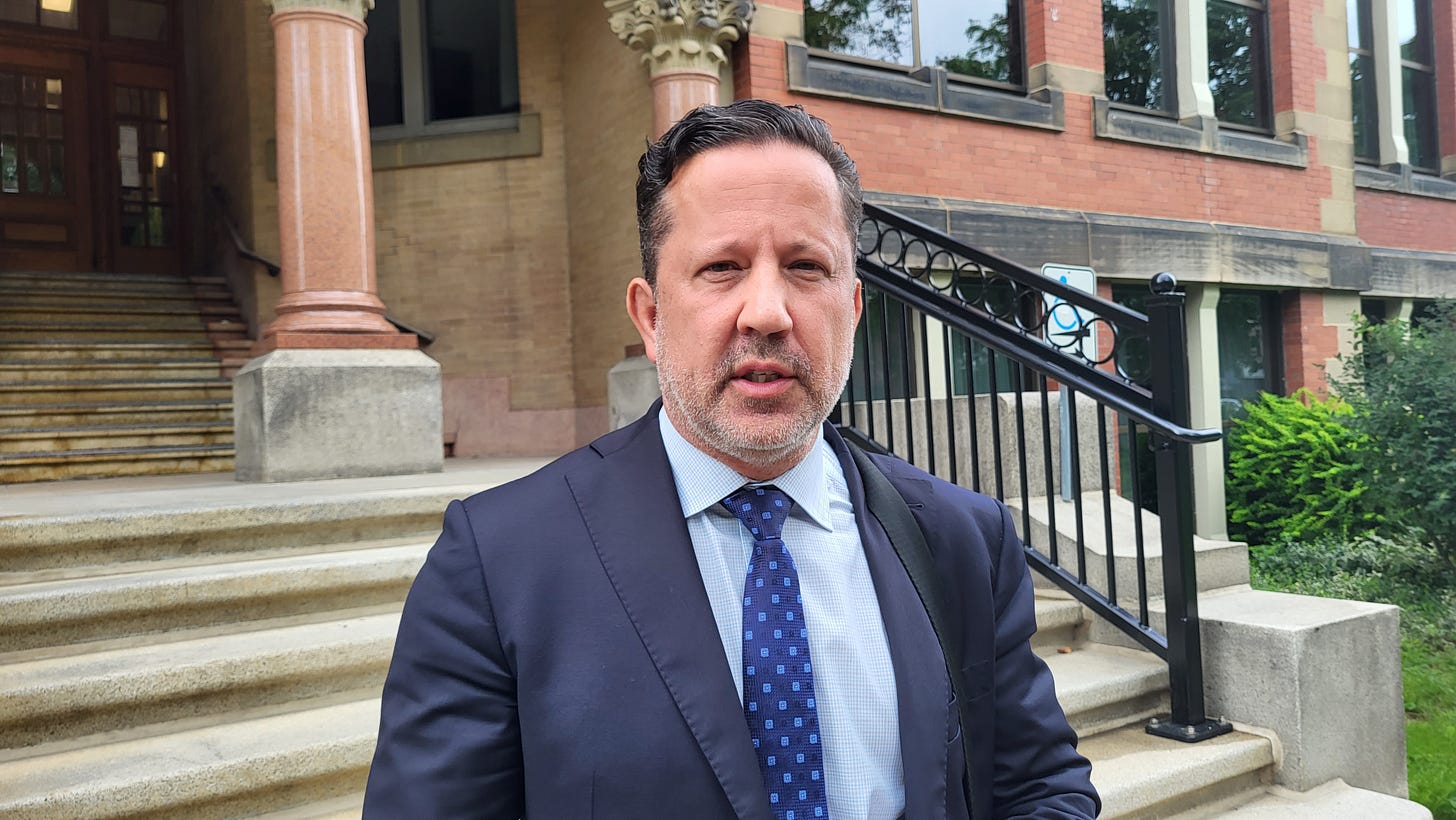Mother gets 9½ years for severe abuse
Judge Natalie LeBlanc imposes longer prison term than what Crown recommended for Fredericton woman who practically tortured her seven-year-old daughter
Warning: This story includes graphic descriptions of extreme child abuse.
A judge imposed a lengthier prison term on an abusive mother Wednesday than the prosecution sought, stating the ongoing violence and cruelty called for even greater denunciation.
A 34-year-old Fredericton woman was back in Fredericton provincial court Wednesday to hear Judge Natalie LeBlanc’s decision on sentencing for serious crimes involving abuse of her children.
There’s a court-ordered publication ban on the identities of her children, and the provincial Family Services Act also precludes the publication of the names of children in protective care.
As such, the Fredericton Independent isn’t naming the victims’ parents, and it’s excluding some details about the family that might tend to identify them.

The defendant pleaded guilty in February to committing an aggravated assault on her then-seven-year-old daughter by wounding her, and assaulting that child with a weapon (a metal rod), both between June 24 and July 21, 2022, in Fredericton.
Furthermore, she admitted to failing to provide the necessaries of life (medical care) for the same child and confining her unlawfully Jan. 1 and July 21, 2022.
The mother of six also pleaded guilty at that time to assaulting two of her other kids between Jan. 1 and July 21, 2022.
LeBlanc said the prosecution and defence had offered different sentencing recommendations: 8½ and 6½ years in prison, respectively, less credit for time spent on remand.
“Therefore, this court is not bound by either recommendation,” the judge said.
Given the horrific circumstances of the crimes, notably toward the little girl who bore the brunt of her mother’s cruelty, LeBlanc decided 9½ years was merited.
While court heard the woman had slapped two of her other children, the most serious and disturbing of her crimes focused on one of her daughters, who was seven years old when the abuse came to the attention of police last summer.
Among the harm, indignities and cruelty visited upon the child by her mother were the following
- denial of water;
- meagre amounts of food, usually only one egg a day, sometimes oversalted to the point it made the girl throw up;
- beatings for vomiting or use of force to get the child to eat that vomit;
- regular beatings for a variety of other reasons, including soiling herself but also for sneaking out of her room to use the toilet;
- beatings with weapons, including a broomstick and a belt;
- infliction of pain and scars with hot metal rods;
- repeated stomping on the girl’s head, causing a severe infection of her ear;
- forcible removal of hair by yanking it from the child’s scalp;
- denial of medical care;
- a bed made up of a broken boxspring, with a soiled mattress and blankets heaped on top of the girl to restrict movement and breathing;
- confinement to her room except when social workers would visit;
- and denial of play time when the family went on outings while her siblings enjoyed activities such as swimming.
“The offences involving [the girl] are on the extreme end of the scale,” LeBlanc said.
“These acts were not temporary nor were they short in duration.”

The girl told police her mother changed when she was five years old, and that’s when the abuse started.
“She was the only one in the house treated this way,” the judge said of the child.
“It bears repeating that this was not a one-time thing.”
LeBlanc said while the seven-year-old had to sleep in squalour that compromised her ability to even rest, two other siblings that shared the same room had proper beds.
Perhaps one of the bizarre elements of the case, she said, was that no one seems to know why the woman turned on this one child while raising the rest of the children relatively normally in comparison.
“To this day, no credible reason or explanation was provided to the court,” LeBlanc said, adding it would be difficult to explain such abhorrent and cruel treatment of any child.
“The bruises [and burn marks] on her body are too numerous to count.”
The judge said the child’s ear was so swollen when doctors examined her the night of July 21, “it barely even resembles an ear.”
Weighing the aggravating and mitigating factors
There were mitigating circumstances for the court to consider, she said, noting the offender pleaded guilty, sparing her children the need to testify in a trial, which would have victimized them further.
The woman was also isolated at home with the children while her husband worked long hours, Leblanc said, and she had limited education, leaving her in the dark about the possibility of getting assistance and treatment for apparent mental-health issues.
She noted the mother expressed remorse in her pre-sentence report interview and now acknowledges she let things go too far and needs help.
But the aggravating elements of the case were overwhelming, the judge said.
The young age of the victims, the fact they were family, the breach of the kids’ trust in a parent and the profound, harmful effects on the children called for a sentence that would deter the offender and others, and denounce what she did, she said.
The trauma on the chief victim is undeniable, LeBlanc said, and it will be with her for a long time. But the other children - even those who weren’t assaulted - witnessed their mother’s brutal treatment of their sister, she said, and it haunts them now and likely will for years to come.
The children report trouble sleeping, she said, and courts have taken judicial notice of the fact that the psychological fallout from such abuse will continue to make itself known in the future.
The children have been in the protective care of the Department of Social Development since police became involved in the case.
In addition to the prison sentence, LeBlanc imposed orders for the woman to submit a DNA sample for inclusion in a criminal database, for the weapons she used on her daughter to be forfeited to the Crown, and for her to have no contact with three of her children - the victims of her crimes - for the duration of her stint behind bars.
The judge also directed that the offender is to be given a customary 1.5-to-one credit for each day she spent on remand. She noted that credit came to 503 days, or about one year and 4½ months.
That means her prison sentence going forward is just a little more than eight years.
What of Social Development?
LeBlanc made note of the failure of child-protection services with the Department of Social Development to intervene more effectively with the family despite repeated, verified reports of abuse over the course of several years.
“It is equally concerning that so many of the claims were substantiated while the children remained in the home,” she said.
Defence lawyer T.J. Burke had argued at the sentencing hearing last month that while his client took responsibility for her crimes, there was plenty of blame to spread around.
He argued that had child-protection workers paid more attention to the family and acted on verified information of concern, the more severe abuse visited on the seven-year-old likely wouldn’t have happened.
But LeBlanc, in rendering her decision on sentence Wednesday, said the shortcomings in Social Development’s responses to the file and the husband’s absence in the home due to long hours working aren’t mitigating circumstances for the court to consider in the woman’s favour.
Those elements don’t diminish her moral blameworthiness in the case at all, the judge said.

Outside the courthouse after Wednesday’s proceedings, Burke told reporters he doesn’t take issue with the specific social workers involved in the case, but rather with staffing shortfalls, a lack of resources and huge caseloads.
“I know social workers are overworked,” he said.
“Had there been more scrutiny, this may not have happened … There’s a lot of what ifs at the end of the day.”
Child and youth advocate Kelly Lamrock confirmed Wednesday his office is delving into the case to see what went wrong, and that will include examining the information that emerged in the criminal case.
“It is our intention to review that and look at progress since the Behind Closed Doors report done by Norm Bossé, my predecessor,” he said. “We have started.”
He was referring to a 2019 report examining the failures of New Brunswick’s child-protection system in the case of five children found in 2016 living in filth and covered in feces when deputy sheriffs entered a Saint John home to evict the family.
That case and this latest one in Fredericton is part of the province’s long, troubled track record in child-protection matters, dating back to John Ryan Turner, who was abused by his parents and starved to death in Miramichi in 1994 when he was just three years old.
LeBlanc even referenced the Turner sentencing decision in the precedents she reviewed in arriving at her decision Wednesday.
Burke said Wednesday he wrestled with the shortcomings at Social Development when he served in a previous Liberal government as a cabinet minister, notably as Attorney General and Justice Minister, but also during his time in opposition.
“I’ve had a long history with that department over the years,” he said. “But more as a lawyer.”
The Fredericton Independent contacted the Department of Social Development Wednesday to ask if newly appointed minister Jill Green had any comment about the case and concerns about the department’s handling of the file.
The department didn’t respond.
Friction between lawyer and client
The defence lawyer said it’s unusual for a judge to impose a longer sentence than what the Crown recommended, but the lack of a joint recommendation from the prosecution and defence left that avenue open to her.
“The judge was free to give more time,” he said.
Burke said he doesn’t know if an appeal might be in the offing, as he has to confer with his client on that issue.
However, his relationship with the woman appeared to be strained in court Wednesday.
At the outset of Wednesday’s proceeding, Burke asked LeBlanc to inquire with his client if she still wanted him to represent her, indicating that she perhaps wanted to fire him as her counsel.
“Do you wish to have Mr. Burke represent you today?” the judge asked her.
“Yes,” the woman answered.
At the end of the lengthy decision, the offender also seemed agitated and frustrated.
“Do you have any questions on your sentence?” LeBlanc asked her.
The woman stood silent for a minute, and after that long pause, she started asking who she should talk to about being the victim of discrimination and about the next possible step in the judicial process.
“She’ll have to talk to her lawyer about that,” the judge said.
Furthermore, the woman’s husband confronted Burke outside the courthouse as he was speaking with reporters.
The defence lawyer told him he doesn’t represent him and that the case was over, in part because the husband was the one who called the police the night of July 21 and told them his wife was crazy.
The husband, and father of the children, is awaiting trial on criminal charges related to some of the same events.
He also faces a charge of failing to provide the necessaries of life to his daughter and thereby causing her bodily harm July 21, and a count of breaching a condition of a police undertaking between July 30 and 31 - namely, that he was to have no contact with his six children.
He denied those allegations and is set to stand trial on the charges later this year.
Unlike his wife, the father was released on conditions following his arrest for the alleged breach of the no-contact order.
Don MacPherson can be contacted at ftonindependent@gmail.com.




The mother would have made the perfect SS guard in the 1940’s. This poor little child will need a great deal of love and counselling.
Awww...poor thing...she feels she was discriminated against. She is lucky the judicial system in Canada is more humane than she is. A true sentence would be for her to live her sentence out as her daughter had to live under her “care”.